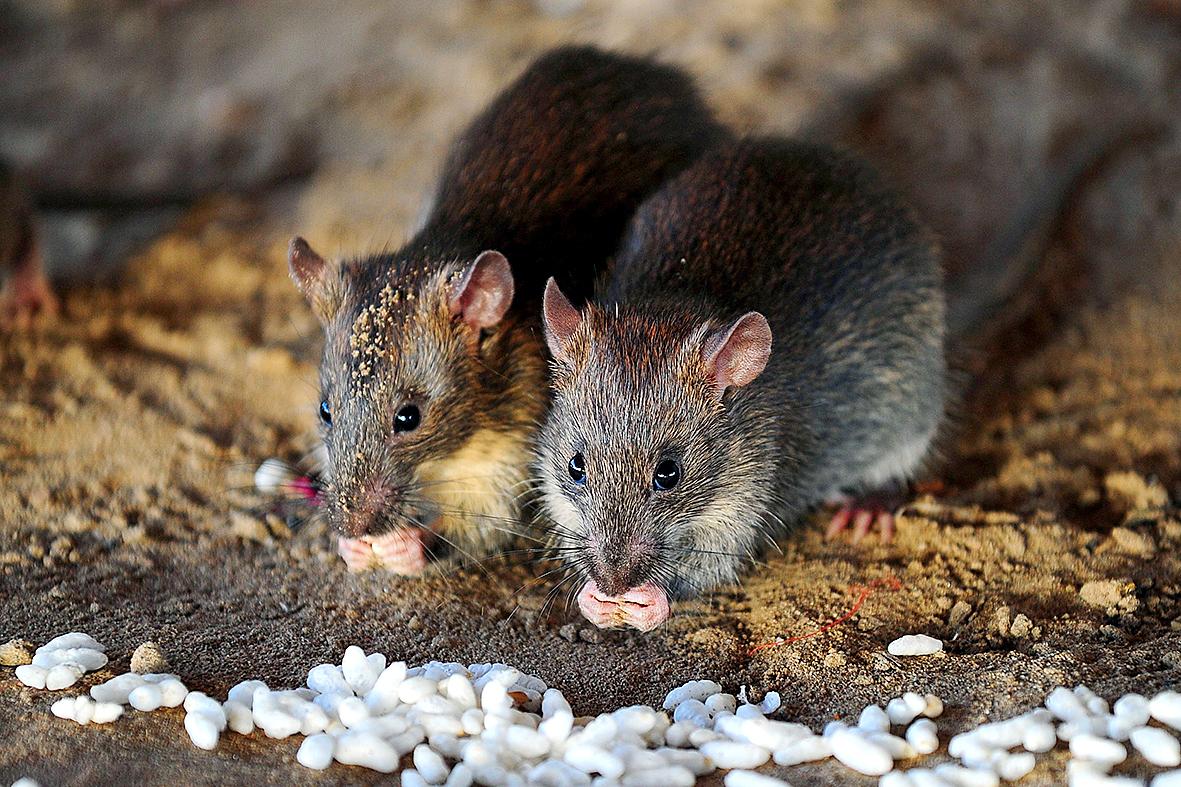Like people, rats cooperate with one another and give food to those in need, but how can they be sure that other rats are being truthful about how hungry they are?
The answer may lie in smell-based cues that signal a rat’s appetite more reliably than its begging gestures and squeaks, a study said Tuesday.
The paper’s lead author, Karin Schneeberger of the University of Potsdam in Germany, said that she was interested in learning more about how social animals identify “cheaters” and freeloaders.

Photo: AFP
She and her colleagues studied Norway rats (Rattus norvegicus), publishing their findings in the journal PLOS Biology. Previous work has shown the rats share their food reciprocally, with the donation of what they deem high value food items, like bananas, more likely to elicit a gift in return than low value items, like carrots. But the scientists believed the calls and gestures used by rats to solicit food might not always reflect their actual needs, allowing dishonest rodents to trick givers out of their hard earned gains.
To test out the idea, they took rats that were either hungry from fasting overnight, or well-fed, and placed them in a separate room from the “focal” rat whose generosity they wanted to test. Air from the rooms of the hungry or well-fed rats was pumped into the chamber of the focal rat. They found that the focal rats were much quicker to provide help — by pulling a food tray within reaching distance of another rat — when the air was pumped from a hungry rat’s room. It took 16 focal rats an average of 29 seconds to provide help for hungry rats, compared to an average of 85 seconds to give help to the well-fed.
The authors then analyzed the air around the rats and found seven different organic compounds that differed significantly in their abundance between hungry and satiated rats.
GOOD RAT CITIZENS
These might result from recently ingested food sources, the metabolic processes involved in digestion, or possibly even a pheromone that indicates hunger. Taken together, these signals form a “smell of hunger” for rats that serves as a reliable cue of need, said Schneeberger.
Apart from identifying freeloaders, the rats may be acting to reduce the suffering of others, she added.
“It could be that they do that out of an emotional state — I don’t really want to call it empathy because that’s something that is very anthropomorphic,” said Schneeberger.
“But having somebody in distress next to yourself can cause stress in yourself too.”
Rats could also be investing in a better rodent society that ultimately serves their own interests, just like humans do, she added.
“Maybe when we are old and we need help crossing the street, then we are also very happy to live in a society where it generally is the rule that you help elderly people to cross the street. “So we try to keep the society as social as possible.”

The canonical shot of an East Asian city is a night skyline studded with towering apartment and office buildings, bright with neon and plastic signage, a landscape of energy and modernity. Another classic image is the same city seen from above, in which identical apartment towers march across the city, spilling out over nearby geography, like stylized soldiers colonizing new territory in a board game. Densely populated dynamic conurbations of money, technological innovation and convenience, it is hard to see the cities of East Asia as what they truly are: necropolises. Why is this? The East Asian development model, with

June 16 to June 22 The following flyer appeared on the streets of Hsinchu on June 12, 1895: “Taipei has already fallen to the Japanese barbarians, who have brought great misery to our land and people. We heard that the Japanese occupiers will tax our gardens, our houses, our bodies, and even our chickens, dogs, cows and pigs. They wear their hair wild, carve their teeth, tattoo their foreheads, wear strange clothes and speak a strange language. How can we be ruled by such people?” Posted by civilian militia leader Wu Tang-hsing (吳湯興), it was a call to arms to retake

This is a deeply unsettling period in Taiwan. Uncertainties are everywhere while everyone waits for a small army of other shoes to drop on nearly every front. During challenging times, interesting political changes can happen, yet all three major political parties are beset with scandals, strife and self-inflicted wounds. As the ruling party, the Democratic Progressive Party (DPP) is held accountable for not only the challenges to the party, but also the nation. Taiwan is geopolitically and economically under threat. Domestically, the administration is under siege by the opposition-controlled legislature and growing discontent with what opponents characterize as arrogant, autocratic

Desperate dads meet in car parks to exchange packets; exhausted parents slip it into their kids’ drinks; families wait months for prescriptions buy it “off label.” But is it worth the risk? “The first time I gave him a gummy, I thought, ‘Oh my God, have I killed him?’ He just passed out in front of the TV. That never happens.” Jen remembers giving her son, David, six, melatonin to help him sleep. She got them from a friend, a pediatrician who gave them to her own child. “It was sort of hilarious. She had half a tub of gummies,